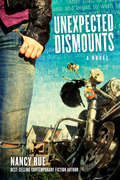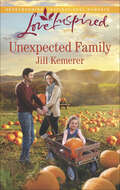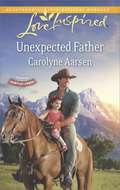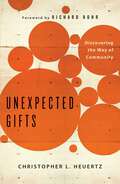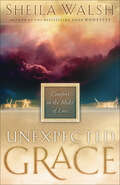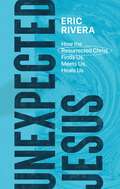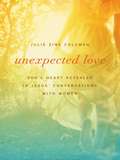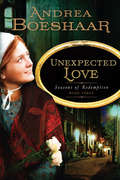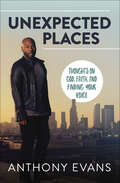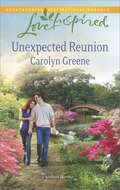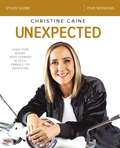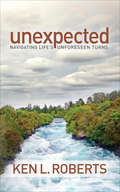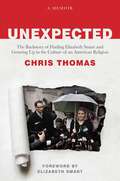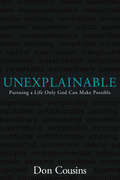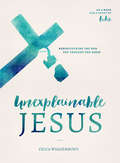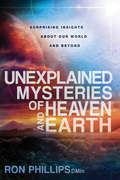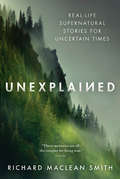- Table View
- List View
Unexpected Dismounts
by Nancy RueAllison Chamberlain thought she was doing everything God required of her--but as her journey continues in the second book of The Reluctant Prophet series, she might have to let go of everything she loves to follow the call.
Unexpected Family
by Jill KemererHis Surprise Daughter After five years apart, Tom Sheffield is shocked to find his ex-wife, Stephanie, on his doorstep. The news that they share a child he's never met sends him reeling. Four-year-old Macy has his eyes, his mouth and, from their first encounter, his heart. Things with her mother are much more complicated. He doesn't understand what went wrong between them or why she kept their daughter a secret. And he's afraid of falling in love all over again. Yet he feels a glimmer of hope that somehow he can convince Macy and Stephanie to stay in Lake Endwell-and with him-for keeps.
Unexpected Father
by Carolyne AarsenNewfound Family Denny Norquest has a plan. Lease a ranch in Hartley Creek and raise cattle. But the baby dropped in his lap changes everything. Soon he's deep in diaper duty-with no end in sight! Bookseller Evangeline Arsenau feels compelled to help the handsome single dad care for his little girl. She's learned the hard way that men can't be trusted, but Denny's unexpected devotion to his daughter has her falling for dad and baby. Is she willing to let down the boundaries she's placed around her heart for the chance at happily ever after? Hearts of Hartley Creek-In this small town, love is just around the corner
Unexpected Gifts: Discovering the Way of Community
by Christopher L HeuertzIn this heartfelt and thoughtful book, Christopher Heuertz writes of the dangers of isolation, the challenges we face when we join together and the struggles and joys that emerge from genuine community bonding.“Ironically, as much as we yearn for deep friendships and meaningful communities, many of us seem to be unable to find our way into them. Even if we know we’re made for community, finding one and staying there seems almost impossible. Though we hate to admit it, if we stay long enough in any relationship or set of friendships, we will experience failure, doubt, burnout, loneliness, transitions, a loss of self, betrayal, frustration, a sense of entitlement, grief, and weariness. Yet it’s these painful community experiences, these tensions we struggle to navigate, that hold surprising gifts.” —FROM THE PREFACE IN A STRIKINGLY confessional tone and vividly illustrated through story, Unexpected Gifts names eleven inevitable challenges that all friendships, relationships, and communities experience if they stay together long enough. Rather than allowing these challenges to become excuses to leave, Chris Heuertz suggests that things like betrayal, transitions, failure, loss of identity, entitlement, and doubt may actually be invitations to stay. And if we stay, these challenges can become unexpected gifts. *** Betrayal, failure, loss of identity, doubt. If your relationships have suffered from any of these pitfalls, this book will show you that staying together can create something more—even something beautiful. IN THIS HEARTFELT and thoughtful book, Christopher Heuertz writes of the dangers of isolation, the challenges we face when we join together, and the struggles and joys that emerge from genuine community bonding. Whether readers are forming a new community, searching for deeper community, or participating in a longtime community, they will find inspiration, caution, guidance, and encouragement as they discover the beauty of pressing in to the ambiguities of growing relationships in this tender and honest testimony about how we are woven together by grace.
Unexpected Grace: Comfort in the Midst of Loss
by Sheila WalshWhen Eleanor Pfaehler and I met, we stood on opposite sides of an invisible, and seemingly insurmountable, wall," Sheila Walsh writes. "Eleanor and I talked over this wall. At times we reached up to hug. But the wall was always there."Then Eleanor was diagnosed with liver cancer. Finally, by the grace and mercy of God alone, the wall came crashing down. Eleanor and I found ourselves swimming in the river of mercy with our arms around each other, holding each other, willing to give our lives for each other."Unexpected Grace is a tender account of the relationship between a mother and daughter-in-law and how they discovered extravagant grace in the midst of what could have been the most tragic experience of their lives. Their story will encourage you and help you see how God can bring good out of even the bleakest circumstances.Previously published as Stories from the River of Mercy.
Unexpected Jesus: How the Resurrected Christ Finds Us, Meets Us, Heals Us
by Eric RiveraThe risen Jesus meets us in our mess Jesus shows up where we least expect him—to Mary Magdalene in the garden, to the disciples on the road to Emmaus, to Thomas when he is full of insecurity. Just as the resurrected Jesus surprised his disciples, he also surprises us today, showing up in the midst of our sorrows, uncertainties, and joys. In Unexpected Jesus, pastor Eric Rivera examines Jesus's appearances after his resurrection to show us how Jesus meets us today. Eric shares his own stories of God showing up amid financial uncertainty, pregnancy loss, a grim medical diagnosis within his family, and the unrest and uncertainty of 2020. Eric's insights will encourage readers as they look to meet God in their own times of uncertainty. The same Jesus who was present with his followers meets us in our mess today. When we feel confused or abandoned, Jesus finds us. When he arrives, the master teacher meets us with questions and guides us into a revelation of who he is. And as we walk with him, he heals us and is faithful in his promise to be with us always.
Unexpected Love
by Julie ColemanHow would you characterize Jesus in his interactions with women? Gracious? Preachy? Aloof? Kind? Dismissive? Unexpected Love is an essential read for anyone eager to understand Jesus Christ's true heart for women. We ache for a satisfying relationship with him and crave his healing touch. So did the women of the first century. Each approached him with something they wanted. They left with more than they could have imagined. Writer and teacher Julie Coleman carefully walks readers through the gospel narratives, offering evidence of a perceptive Savior deeply concerned about the women he met. Through vivid descriptions, thoughtful questions, and empowering applications, she brings a fresh perspective to these sometimes puzzling stories. Unexpected Love offers a compelling vision of a Savior who meets us where we are and will take us where we need to go. Discover his passion for women. What you read will impact your own relationship with him. You will fall in love with the dynamic, beautiful, and unexpectedly personal Jesus.
Unexpected Love: Seasons of Redemption, Book Three (Seasons of Redemption #3)
by Andrea BoeshaarNurse Lorenna Fields always took her job at Chicago's Lakeview Hospital seriously, determining never to become personally involved with her patients. Then a mysterious man with eyes like onyx is admitted after a shipwreck on Lake Michigan. He has lost his memory and sight. Renna feels a special kinship with this man and dubs him Mr. Blackeyes. Soon the two build a strong trusting friendship, and Renna shares her faith in the Lord. But she dreads the day her patient will recover. His memory will take him away from her to family and friends now forgotten, and his regained sight will reveal a secret about herself that Renna has been trying hard to hide. But someone else besides Renna doesn't want "Mr. Blackeyes" to remember the past...and may not allow him to live to see the future.
Unexpected Places: Thoughts on God, Faith, and Finding Your Voice
by Anthony EvansUnexpected Places is the personal story of gospel singer Anthony Evans, son of well-known pastor Tony Evans and brother of author Priscilla Shirer. In this intimate and moving memoir, Anthony shares the details of his struggles with depression and doubt, and encourages readers with the unique story of his search for purpose and identity. From growing up duty-bound to his name, to his time as a finalist and then talent producer on The Voice, Anthony explores the pressures he experienced as a child and as a young man in Hollywood. He describes the journey to his renewed faith in God and exposes the vast differences between what the world teaches us to value and how God values us. Anthony examines what his parents did right in raising him but also describes how they unknowingly missed his pain. Finally, he reveals how God orchestrated His plan to grow Anthony into a man who is in love with his life, his heritage, and his individual calling.Anthony has learned to embrace the incredible beauty of his unique voice. In Unexpected Places, he invites readers on their own journey to do the same.
Unexpected Reunion
by Carolyn GreeneA Soldier's Return For four years, Ruthie Chandler avoided the man who broke their engagement-and her heart. But when her antiques shop mistakenly sells his ailing grandmother's doll, she comes face-to-face with the man she never forgot. Teaming up with Gray Bristow on this important mission won't be easy, but Ruthie suspects it's exactly what the disillusioned veteran needs. The doll is the key to Gray's family's past-and possibly his future. And it may be what finally brings the ex-soldier home to faith...and to Ruthie. Southern Blessings: Three friends find hope and love in Virginia
Unexpected Study Guide: Leave Fear Behind, Move Forward in Faith, Embrace the Adventure
by Christine CaineLife is an unpredictable journey full of twists and turns. The good news is that while we don’t always know what’s going to happen, we can always trust that God uses everything in our lives as an invitation to rely on him more deeply and completely.In this five-session video Bible study, bestselling author Christine Caine shows that while most of us have been trained to fear the unexpected and want everything to be “under control,” God wants us to anticipate the unexpected with a faith-filled perspective rooted in trust. He has never been taken by surprise.We can move from a life filled with fear, control, and feeling stuck to one full of hope, faith, and trust. In an age of upheaval, we can still expect our God to be good and do good. We can trust God in the unpredictable circumstances of life by anticipating, welcoming, and even embracing the unexpected.The Unexpected Study Guide includes video discussion questions, Bible exploration, and personal study material for between sessions.Sessions include:Expect the UnexpectedUnexpected PeopleAn Unexpected AssignmentUnexpected Endings Bring New BeginningsUnexpected ResurrectionDesigned for use with the Unexpected Video Study (9780310089322) sold separately.
Unexpected: Leave Fear Behind, Move Forward in Faith, Embrace the Adventure
by Christine CaineIs it possible to have peace in an uncertain world? To not only expect the unexpected but embrace it?Most of us want to have life under control. But God wants us to anticipate the unexpected with a faith deeply rooted in his goodness. He wants us to know that because he is in control, we don’t have to be.In Unexpected, beloved author Christine Caine helps us walk into the life God has for us—unknowns and all. Using dramatic examples from her own journey, Christine offers real-life strategies and biblical inspiration to help us move from fear and worry about ourselves to hope and trust in God. As we learn new ways to manage disappointment, strengthen our hearts, and build our faith, we can enjoy a new adventure with God that is more fulfilling than any day we spend trying to anticipate what will happen next.Stepping into our God-given destiny means stepping into the unknown, but we can embrace that calling because God knows it already. Nothing in our lives takes God by surprise. So even in the midst of personal upheaval, relational challenges, financial stresses, family transitions, career disappointments, and chaotic world affairs, we can expect God to be good and do good. What other expectation do we need to have? Listen to God’s dare to trust him in every unknown of your life today.
Unexpected: Navigating Life's Unforeseen Turns (Morgan James Faith)
by Ken L. RobertsOn a routine trip to a women’s Bible study, Ken’s wife of twenty-five years was killed in a car accident. At the time of the accident, Ken was forty-seven years of age, the father of two adult children, and the pastor of a large and growing congregation. Using his own story, as well as his thirty plus years of experience in pastoring hundreds of others through adversity and tragedy, Ken in his new book Unexpected: Navigating Life’s Unforeseen Turns will help you navigate through your unexpected turns in life and in the process become the person you hope to become.
Unexpected: The Backstory of Finding Elizabeth Smart and Growing Up in the Culture of an American Religion
by Chris ThomasThe backstory of finding Elizabeth Smart and how growing up in the Mormon culture pushed the author to develop the exact kind of intuition that was needed to help manage Elizabeth&’s kidnapping and rescue while the world watched.Chris Thomas is not yet thirty years old when he finds himself managing the immense pressure, eccentric personalities, and extenuating circumstances of an international story, where one small misstep could adversely impact the search for a missing teenager and the reputation of her family. Now, twenty years later, Thomas takes readers behind the scenes, providing new details, perspectives, and commentary on finding Elizabeth Smart. In the process of reflecting on Elizabeth&’s search and rescue, Thomas discovers how growing up in the culture of The Church of Jesus Christ of Latter-day Saints (commonly known as Mormon) helped push him to develop the exact kind of intuition needed to manage Elizabeth&’s kidnapping and rescue, and to do so while the world watched. Unexpected juxtaposes crucial events from the Smart case with Thomas&’s experience growing up in the Latter-day Saint culture, including coming to understand the secret of a broken war hero before it was too late.
Unexplainable
by Don CousinsFrom trusted author Don Cousins comes Unexplainable, a dynamic book designed to help people find true fulfillment by shifting their life view from outside-in to inside-out.Most of us live our lives from the "outside-in." This means we try to order our external circumstances (family, finances, career, friends, leisure, etc.) in such a way that we feel happy, secure, and content within.But this approach simply doesn't work. Few of us are ever able to get our life circumstances just as we want, and even when we feel we do, it doesn't last.More importantly, the Bible makes it clear that God intended life to be experienced "inside-out." Unexplainable will inspire you to pursue a life for which there's no logical explanation apart from God.
Unexplainable Jesus: Rediscovering the God You Thought You Knew
by Erica WiggenhornWhen&’s the last time you were captivated by Jesus?Crowds clamored, women wept in awe, disciples dared to do the impossible—all because of Jesus. Somewhere in the overly familiar we&’ve lost our fascination. Whether you&’re worn thin, filled with questions, or desperate for more of God, come encounter Unexplainable Jesus. Experience the culture and customs of His day and follow Him into a life unimaginable. This study features:in-depth study of Luke (40 lessons over 8 weeks)historical and cultural insightssoul-searching questionsaccess to extensive online resourcesStep into the streets of Jerusalem and encounter the Jewish Rabbi who turned the world upside down. After rediscovering Jesus on the pages of the book of Luke—or maybe discovering Him for the very first time—you&’ll see there is no other plan, goal, ambition, or Person worth following but Jesus.Plus, check out the Unexplainable Jesus DVD, which contains hours of all-new video teaching content from Erica Wiggenhorn.
Unexplainable Jesus: Rediscovering the God You Thought You Knew
by Erica WiggenhornWhen&’s the last time you were captivated by Jesus?Crowds clamored, women wept in awe, disciples dared to do the impossible—all because of Jesus. Somewhere in the overly familiar we&’ve lost our fascination. Whether you&’re worn thin, filled with questions, or desperate for more of God, come encounter Unexplainable Jesus. Experience the culture and customs of His day and follow Him into a life unimaginable. This study features:in-depth study of Luke (40 lessons over 8 weeks)historical and cultural insightssoul-searching questionsaccess to extensive online resourcesStep into the streets of Jerusalem and encounter the Jewish Rabbi who turned the world upside down. After rediscovering Jesus on the pages of the book of Luke—or maybe discovering Him for the very first time—you&’ll see there is no other plan, goal, ambition, or Person worth following but Jesus.Plus, check out the Unexplainable Jesus DVD, which contains hours of all-new video teaching content from Erica Wiggenhorn.
Unexplained Mysteries of Heaven and Earth: Surprising Insights About Our World and Beyond
by Ron PhillipsDiscover the truth behind the world’s greatest mysteries We live in a beautiful world full of miracles. But so many people think that Christianity is simply a “fairy tale” religion complete with talking snakes and donkeys, magical fruit and paranormal healings, but it is simply not so. Unexplained Mysteries of Heaven and Earth investigates the physical evidence that speaks to the truth of Scripture, demonstrating that Christianity is a religion founded on fact. So join Ron Phillips as he combines his trademark theological balance with extensive historical research to travel through time to look at: · The Flood · Lost Atlantis · The Great Pyramid · The Antichrist · The Rapture · And other mysteries of God!
Unexplained: Real-Life Supernatural Stories for Uncertain Times
by Richard MacLean SmithIn every corner of this earth there are secrets. They are hidden in the dark edge of the woods, nestled in the cold stars, and staring out from a stranger's eyes. And whether they be demonic possession or an unsolved murder, the unknown has always haunted our dreams. From the hit podcast Unexplained comes a volume perfectly crafted for the curious, the cynical, and the not-easily-frightened. Richard Maclean Smith is the expert in the unknown, and humbly offers up ten tales of real-life events that continue to evade explanation. With these chilling stories comes the missing key: a connection to our own beliefs in science, superstition, and perception. What can a case of demonic possession teach us about free will? What can a cursed box show us about the act of storytelling? What can a supposed instance of reincarnation tell us about developing a concept of the self? Perhaps some things are just better left unexplained...
Unfading Light: Contemplations and Speculations
by Sergius BulgakovWith its scholarly discussions of myth, German idealist philosophy, negative theology, and mysticism, shot through with reflections on personal religious experiences, Unfading Light documents what a life in Orthodoxy came to mean for Sergius Bulgakov on the tumultuous eve of the 1917 October Revolution. Written in the final decade of the Russian Silver Age, the book is a typical product of that era of experimentation in all fields of culture and life. Bulgakov referred to the book as miscellanies, a patchwork of chapters articulating in symphonic form the ideas and personal experiences that he and his entire generation struggled to comprehend. Readers may be reminded of St. Augustine's Confessions and City of God as they follow Bulgakov through the challenges and opportunities presented to Orthodoxy by modernity.
Unfailing Love: Growing Closer to Jesus Christ
by Rebecca LairdIn this six-week Sisters study, Rebecca Laird introduces readers to a Jesus they may never have met before: Jesus the friend. Using close, personal friendship as a model and the Gospel of Luke as the text, readers explore the life of Jesus and the ways in which Jesus the Christ reaches out to each person, offering deep spiritual friendship and unfailing love.
Unfailing: Standing Strong on God's Promises in the Uncertainties of Life (Seedbed Resources)
by Rob RenfroeWe've all experienced the pain of broken promises. When those we love fail to keep their commitment to us, we feel betrayed and hurt, less likely to trust again. People fail us. Plans fail. But there is one who is unfailing, who always keeps his word.In Unfailing, pastor and teacher Rob Renfroe reminds us that because God is faithful to his Word we can base our lives on what he has said. And though hard times may follow where we experience confusion, loss, and pain--feeling overwhelmed--if we stand on the promises of God we, too, will not fail. Jesus promised that everyone who hears his words and puts them into practice is like a wise man who builds his house on a rock. Though the storms blow and the streams rise, the house does not fail because it is built on the rock.Renfroe unpacks seven key ways in which God will not fail you, looking at God's promises, grace, peace, presence, guidance, power, strength, and love. Each of these is an important and essential aspect of God's trustworthy and unfailing character, reflecting his faithfulness to you. Each chapter includes a sample prayer as well as personal reflection questions that help you to further apply these truths to your life.
Unfaithful
by Gary Shriver Mona ShriverStatistics show that one in every four marriages is impacted by infidelity. So the odds are pretty good that you or someone you know has experienced the searing pain of marital infidelity. But adultery is not an automatic death sentence for your marriage. You can trust again. You can restore intimacy. You can have a relationship that you will both cherish for a lifetime.Ten years ago, Gary and Mona Shriver experienced the devastation caused by adultery, and in the course of trying to save themselves, they wrote this book. Raw, transparently honest, the Shrivers' story alone is an inspiration, offering hope and practical strategies for healing. Now this updated and revised edition adds other real-life stories of betrayal and forgiveness, and new information defining adultery, including the destruction of emotional affairs. Some doubt if a marriage can truly heal after the ravages of infidelity. Unfaithful proves you can. It's not easy ... but it can be done. Is it worth it? Yes. And you hold the first step--and hope--in your hand.
Unfamiliar Territory
by James JudgeIgnoring the pleas of friends and colleagues and refusing to give in to nagging fears, Dr. James Judge divorced a life of privilege for an uncivilized village and an unknown people. Forever changed by a relief trip to Africa, he abandoned his practice, sold all his worldly belongings, and uprooted his family, giving up everything he once held dear to return to the remote village of Lamu, Kenya. In this unbelievably true story, Judge chronicles the remarkable people he encountered and what they taught him about mercy, compassion, and the power of the human spirit.
Unfashionable: Making a Difference in the World by Being Different
by Tullian TchividjianFrom the foreword to the book by Tim Keller: “Here you will learn how we must contextualize, how we Christians should be as active in Hollywood, Wall Street, Greenwich Village, and Harvard Square (if not more) than the halls of Washington, DC. And yet, there are ringing calls to form a distinct, ‘thick’ Christian counter-culture as perhaps the ultimate witness to the presence of the future, the coming of the Kingdom. ” “Tullian Tchividjian, one of today’s brightest young Christian leaders, makes a refreshing call for orthodoxy. He does not apologize for the gospel; he wears it like a red badge of courage. Read this book to recover the faith once for all delivered to the saints in fresh, courageous terms. ” –Chuck Colson, founder of Prison Fellowship and author of The Faith “Tullian Tchividjian is the real deal. His life and his words speak in stereo. I love reading books that challenge the way I think. Unfashionable goes beyond that. It’s counterintuitive. It’s counter-cultural. And it’s a must-read for those brave enough to really follow in the footsteps of Jesus. ” –Mark Batterson, lead pastor of National Community Church in Washington D. C. and author of Wild Goose Chase “With the right balance of reproof and encouragement, critique and construction, Unfashionable displays with succinct, vivid, and engaging clarity the relevance of the gospel over the trivialities that dominate our lives and our churches right now. . ” –Michael Horton, J. Gresham Machen professor, Westminster Seminary in California, and host of White Horse Inn “Plainly, powerfully, and pastorally, Unfashionable gives a bird’s-eye view of the real Christian life–Christ-centered, church-committed, kingdom-contoured, future-focused, and counter-cultural all the way. It makes for a truly nutritious read. ” –J. I. Packer, professor of theology at Regent College and author of Knowing God “In this windowless world, God, transcendence, and mystery have become less and less imaginable…. Everything’s produced, managed, and solved ‘this side of the ceiling,’ which explains why so many people are restless and yearning, as I was, for meaning that transcends this world–for something and Someone different. ” –from Unfashionable
